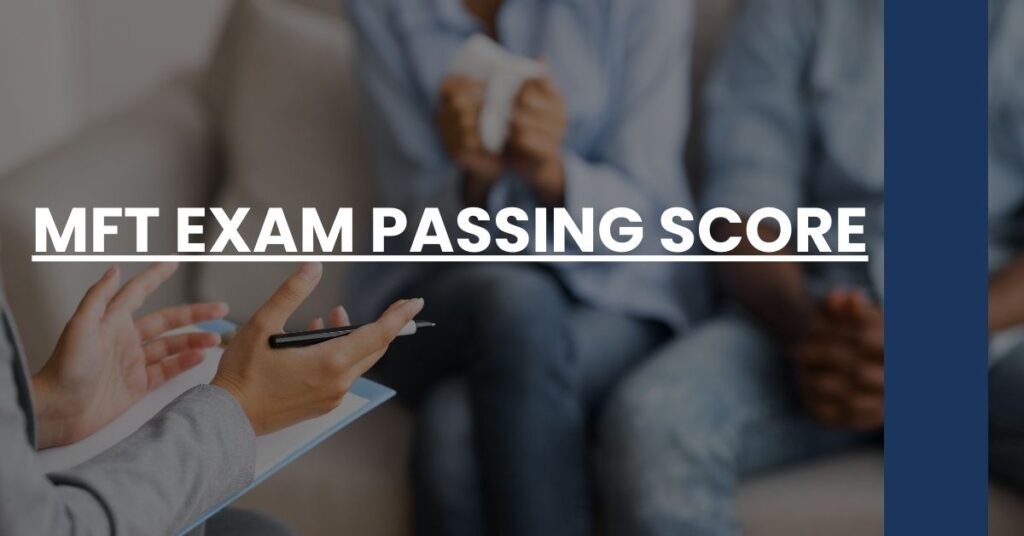The passing score for the MFT Exam isn’t a fixed number like 70 or 80; instead, it’s determined based on the exam’s difficulty, reviewed by an expert panel each time. This criterion is pivotal in securing your licensure as a Marriage and Family Therapist (LMFT), ensuring that you have the competence required for professional practice.
In this article, we explore:
- The variables that influence the MFT Exam’s passing score
- How to interpret score reports and understand state-specific requirements
- Effective strategies to prepare for the exam and succeed
Whether you’re a recent graduate or a seasoned practitioner, understanding the MFT Exam passing score is your key to advancing in this fulfilling career. Let’s get you ready to excel.
- Introduction
- What is the MFT Exam?
- Understanding the MFT Exam Passing Score
- How Is the MFT Exam Scored?
- Minimum Passing Standards Explained
- Factors Influencing the Passing Score
- The Role of Score Reports in the MFT Exam
- State-Specific Passing Scores for MFT Exam
- Common Misconceptions About the MFT Exam Score
- Preparing to Meet the MFT Exam Passing Score
- When Are MFT Exam Scores Released?
- Retaking the MFT Exam After a Failing Score
- Importance of the Exam for Professional Practice
- Conclusion
Introduction
If you’re on the path to becoming a licensed Marriage and Family Therapist (MFT), you’ve likely encountered the critical hurdle of the MFT Exam. It’s a significant milestone that evaluates your readiness to enter professional practice. Understanding the mft exam passing score and how it’s determined is crucial to your success and entry into a rewarding career supporting families and couples in their emotional and relational lives.
What is the MFT Exam?
The Marriage and Family Therapy (MFT) Exam is your gateway to licensure. Administered by the Association of Marital and Family Therapy Regulatory Boards (AMFTRB), it’s a standardized test designed to evaluate your knowledge and skills. You are expected to demonstrate the ability to apply a broad base of theoretical and practical knowledge in therapy with individuals, couples, and groups.
Before you can sit for this exam, you must meet education and training requirements, which typically vary by state. Once you’ve fulfilled these prerequisites, the MFT Exam stands between you and your goal of becoming a Licensed Marriage and Family Therapist (LMFT).
Understanding the MFT Exam Passing Score
Now, to the heart of your quest: the mft exam passing score. Unlike some tests, where a specific percentage or number equals passing, the MFT Exam uses a scaled score. The AMFTRB, together with the Professional Testing Corporation (PTC), employs a modified Angoff method to determine this passing score. Each exam form has its own passing standard, so it’s vital to understand that your success isn’t measured against a fixed mark like “70 out of 100,” but against a standard that reflects the difficulty of your specific exam form.
To add to this, the passing score can differ across states. This means that you’ll need to be well-informed about the standards set by the licensing board in the state where you intend to practice.
How Is the MFT Exam Scored?
Tailoring your study plan to the scoring system of the MFT Exam is smart preparation. Here’s the deal: each question on the exam is worth one point, and your raw score — the total number of questions you answer correctly — is converted to a scaled score. This scaled score accounts for any variations in difficulty across different versions of the exam.
After taking the exam, if you find the results unexpected, you have the option to request hand scoring for an additional fee. While it’s rare that the score will change upon review, this offers a second look to ensure every answer was accounted for accurately.
Minimum Passing Standards Explained
The minimum passing standard is based on the concept that regardless of which form of the exam you take, you should demonstrate the same level of competency. The passing score reflects the minimal level of expertise necessary to practice safely and ethically as an MFT.
It’s established by a panel of experts who review each exam question and reach a consensus on what a minimally competent therapist should be able to answer correctly. This method ensures each candidate is held to a consistent standard of knowledge and skill, tailored to the demands of the field.
Factors Influencing the Passing Score
It’s natural to wonder why the passing score isn’t a simple number. The reason stems from the desire to maintain a fair testing process. As the difficulty of questions may vary from one exam form to another, so does the passing score. This ensures that all candidates have an equal chance of passing the exam, regardless of the specific questions they encounter.
In response to new advancements or changes within the field, the exam and the passing score can be updated. This fluid approach guarantees that the assessment remains relevant and continues to reflect current best practices in marriage and family therapy.
The Role of Score Reports in the MFT Exam
Understanding your score report is key to comprehending how you performed on the exam. It provides a breakdown of your scores across different content areas, highlighting your strengths and areas you may need to review.
This detailed report can guide you in refining your study strategy, particularly if you plan to retake the exam. Interpreting the score report can be complex, so be sure to reach out to the PTC or consult the AMFTRB’s FAQ if you have questions about what your scores mean in relation to the passing standard.
Moving forward, recognizing the nuances in state-specific requirements and common misconceptions about the exam will further clarify your path to becoming an LMFT.
State-Specific Passing Scores for MFT Exam
As you journey towards becoming a licensed therapist, it’s important to remember that the mft exam passing score can vary from state to state. Each licensing board may set its own benchmark for what it considers a passing grade. For example, what suffices in California might not meet the threshold in New York.
Before you schedule your exam, take a moment to research the passing score requirement in your state. This can usually be found on your state’s board of behavioral sciences website or through a quick inquiry to the board. Ensure that you’re preparing with the appropriate end goal in mind. For a comprehensive list of state requirements, check out the resources at the AMFTRB website.
Why the variation? It can come down to differing perceptions of what constitutes competent practice or slight variations in state licensure laws. This discrepancy underscores the importance of being well-versed with your own state’s standards as you prepare for the MFT Exam.
Common Misconceptions About the MFT Exam Score
In your quest to understand the mft exam passing score, you may encounter several myths and misconceptions.
- Myth 1: A score in the 60s on practice exams will ensure you pass.
- Myth 2: The exam is filled with trick questions designed to fail candidates.
Let’s set the record straight. Scoring in the 60s on practice exams is not a guaranteed indicator of success on the actual exam due to the variability of the scaled score and the different difficulty levels of exam questions. As for the worry about trick questions, rest assured that the AMFTRB aims to test your knowledge and competency, not your test-taking trickery. Learn more about debunking these misconceptions at Psychotherapy Notes.
Remember, your goal is to demonstrate competency, not just to outsmart the test. Direct your energies towards understanding the content, and the scores will follow.
Preparing to Meet the MFT Exam Passing Score
The journey to conquering the mft exam passing score can be rigorous, but with the right strategy, it’s within your reach. Consider these tips as you craft your study plan:
- Understand the Exam Format: Familiarize yourself with the structure of the exam itself. Knowing how questions are presented and what areas they focus on will help you study more effectively.
- Use Quality Study Materials: Invest in reputable study guides, flashcards, and practice tests. They can be a rich source of information and a good indicator of your progress.
- Create a Study Schedule: Allocate time for each content area and stick to your plan. Consistency is key when it comes to retaining information.
- Seek Support: Whether it’s joining a study group or seeking out a mentor, having support can boost your confidence and clarify tough concepts.
Success is not an accident; it’s the result of intentional efforts. Begin your preparations early, and adjust your methods as needed to ensure you’re making the most of your study time.
When Are MFT Exam Scores Released?
After completing the exam, you’re naturally eager to know how you performed. Generally, MFT Exam scores are released within 20 business days following the end of the testing period. You will receive notification of your results, which can either bring the elation of success or provide insight into areas needing improvement.
If 20 business days have passed and you haven’t received your scores, don’t hesitate to contact PTC directly for assistance. You can find more detail about the score release policy on the AMFTRB FAQ page, which will help alleviate any concerns you might have about the process.
Retaking the MFT Exam After a Failing Score
Nobody wants to consider the possibility of not passing the exam on the first try. However, if this happens, it’s not the end of the line. You can sit for the MFT Exam again, though policies on retaking will vary by state, and you may be subject to a waiting period and additional fees.
Use this time as an opportunity. Analyze your score report, refocus your study efforts, and reach out for additional support if necessary. It’s also important to review the ‘Handbook for Candidates’ provided by Prometric, which will guide you through steps for rescheduling the exam.
Each attempt is a learning experience, bringing you closer to your goal of passing the MFT Exam. For more information on retake policies and scheduling, visit the Prometric website.
Importance of the Exam for Professional Practice
Achieving the mft exam passing score is more than a formality; it’s a testament to your preparedness to provide quality therapeutic services to those in need. By demonstrating that you possess the essential knowledge and skills, you gain the trust of clients and colleagues alike, establishing your credibility in the field.
The licensing process, with the MFT Exam at its core, upholds the standards of the marriage and family therapy profession. It ensures that everyone practicing has met rigorous criteria, sustaining the reputation and integrity of the field.
Conclusion
The path to becoming a licensed Marriage and Family Therapist is marked by dedication and the mastery of your craft, with the MFT Exam as a cornerstone. Understanding the mft exam passing score and how it’s determined is a pivotal step towards your professional development.
Throughout this article, we’ve unraveled the complexities surrounding the exam scores, state-specific requirements, and the myths clouding your journey. With sound preparation strategies and a clear understanding of the scoring process, you’re now better equipped to approach the exam with confidence.
Remember, every twist and turn in this path is a chance to affirm your commitment to helping others. Keep your eyes on the goal, and let this challenge be the making of an outstanding therapy professional. Best of luck as you embark on this defining phase of your career.
MFT Exam Passing Score: Discover the key to becoming a licensed Marriage and Family Therapist by understanding and achieving it.

